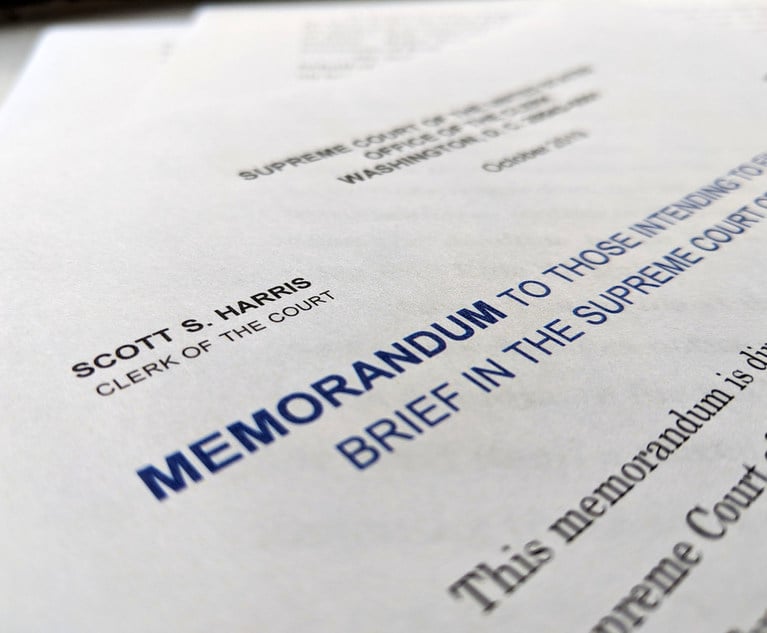 U.S. Capitol. (Photo: Mike Scarcella/ALM)
U.S. Capitol. (Photo: Mike Scarcella/ALM)Doug Letter Will Make 2nd Supreme Court Argument, Allotted Time in Census Case
The new House general counsel will get 10 minutes of the 40 minutes accorded to the challengers, who include New York Solicitor General Barbara Underwood and Dale Ho, director of the ACLU's voting rights project.
April 12, 2019 at 04:38 PM
4 minute read
Douglas Letter, formerly one of the U.S. Justice Department's foremost appellate lawyers and now general counsel of the U.S. House of Representatives, will return to the U.S. Supreme Court lectern for the first time in 36 years to argue in the highest profile, political case of the term.
The Supreme Court on April 12 extended argument time in U.S. Department of Commerce v. New York, in which the Trump administration is defending its decision to place a citizenship question on the 2020 census.
Letter, whose motion for argument time was granted, will get 10 minutes of the 40 minutes accorded to the challengers, who include New York Solicitor General Barbara Underwood (20 minutes) and Dale Ho, director of the ACLU's voting rights project for the New York Immigration Council (10 minutes). They will face U.S. Solicitor General Noel Francisco (40 minutes).
In the space of roughly one year, Letter has moved from director of the Justice Department's civil appellate staff to a senior litigating position with an institute at Georgetown University Law Center to the House's general counsel office.
 Douglas Letter, arguing in the Ninth Circuit in 2011. (Photo: C-SPAN)
Douglas Letter, arguing in the Ninth Circuit in 2011. (Photo: C-SPAN)In his most recent position, Letter is now at the center of some of the most contentious legal battles with the Trump administration, not just the census case but also the fight over the Affordable Care Act now pending before the U.S. Court of Appeals for the Fifth Circuit. He also is likely to be in the forefront of potential court subpoena fights over President Donald Trump's income taxes, the final report of Special Counsel Robert Mueller and more.
Letter made his only argument in the Supreme Court when he was 29 in the case United States v. Sells Engineering. He represented the United States.
Argued in March 1983, the question before the justices was under what conditions attorneys for the Justice Department's civil division, their paralegal and secretarial staff and all other necessary assistants, could get access to grand jury materials, compiled with the assistance and knowledge of other Justice Department attorneys, for the purpose of preparing and pursuing a civil suit.
Justice William Brennan, writing for a 5-4 majority, ruled against the government, holding that access was permissible only when the Government moves for court-ordered disclosure under Federal Rule of Criminal Procedure 6(e)(3)(C)(i) and makes the showing of particularized need required by the rule.
In his motion for argument time in the census case, Letter, joined by Hogan Lovells partner Neal Katyal and Georgetown's Institute for Constitutional Advocacy and Protection, told the justices that the House “has a paramount institutional interest and perspective in this case that merits granting it divided argument time.”
The lawyers added: “The decennial census is a vital cornerstone of our democratic institutions, and none more so than the House of Representatives. The House as a chamber depends upon an accurate census for its institutional integrity, and its membership will be affected by the outcome of this case.”
This content has been archived. It is available through our partners, LexisNexis® and Bloomberg Law.
To view this content, please continue to their sites.
Not a Lexis Subscriber?
Subscribe Now
Not a Bloomberg Law Subscriber?
Subscribe Now
NOT FOR REPRINT
© 2024 ALM Global, LLC, All Rights Reserved. Request academic re-use from www.copyright.com. All other uses, submit a request to [email protected]. For more information visit Asset & Logo Licensing.
You Might Like
View All
Divided 5th Circuit Shoots Down Nasdaq Diversity Rules

Nevada Supreme Court to Decide Fate of Groundbreaking Contingency Cap Ballot Measure
5 minute read
Lawyers, Law Groups Oppose Proposal to Require Court Approval for Amicus Briefs

9th Circuit Judges Weigh if Section 230 Shields Grindr From Defective Design Claims
Trending Stories
- 1Call for Nominations: Elite Trial Lawyers 2025
- 2Senate Judiciary Dems Release Report on Supreme Court Ethics
- 3Senate Confirms Last 2 of Biden's California Judicial Nominees
- 4Morrison & Foerster Doles Out Year-End and Special Bonuses, Raises Base Compensation for Associates
- 5Tom Girardi to Surrender to Federal Authorities on Jan. 7
Who Got The Work
Michael G. Bongiorno, Andrew Scott Dulberg and Elizabeth E. Driscoll from Wilmer Cutler Pickering Hale and Dorr have stepped in to represent Symbotic Inc., an A.I.-enabled technology platform that focuses on increasing supply chain efficiency, and other defendants in a pending shareholder derivative lawsuit. The case, filed Oct. 2 in Massachusetts District Court by the Brown Law Firm on behalf of Stephen Austen, accuses certain officers and directors of misleading investors in regard to Symbotic's potential for margin growth by failing to disclose that the company was not equipped to timely deploy its systems or manage expenses through project delays. The case, assigned to U.S. District Judge Nathaniel M. Gorton, is 1:24-cv-12522, Austen v. Cohen et al.
Who Got The Work
Edmund Polubinski and Marie Killmond of Davis Polk & Wardwell have entered appearances for data platform software development company MongoDB and other defendants in a pending shareholder derivative lawsuit. The action, filed Oct. 7 in New York Southern District Court by the Brown Law Firm, accuses the company's directors and/or officers of falsely expressing confidence in the company’s restructuring of its sales incentive plan and downplaying the severity of decreases in its upfront commitments. The case is 1:24-cv-07594, Roy v. Ittycheria et al.
Who Got The Work
Amy O. Bruchs and Kurt F. Ellison of Michael Best & Friedrich have entered appearances for Epic Systems Corp. in a pending employment discrimination lawsuit. The suit was filed Sept. 7 in Wisconsin Western District Court by Levine Eisberner LLC and Siri & Glimstad on behalf of a project manager who claims that he was wrongfully terminated after applying for a religious exemption to the defendant's COVID-19 vaccine mandate. The case, assigned to U.S. Magistrate Judge Anita Marie Boor, is 3:24-cv-00630, Secker, Nathan v. Epic Systems Corporation.
Who Got The Work
David X. Sullivan, Thomas J. Finn and Gregory A. Hall from McCarter & English have entered appearances for Sunrun Installation Services in a pending civil rights lawsuit. The complaint was filed Sept. 4 in Connecticut District Court by attorney Robert M. Berke on behalf of former employee George Edward Steins, who was arrested and charged with employing an unregistered home improvement salesperson. The complaint alleges that had Sunrun informed the Connecticut Department of Consumer Protection that the plaintiff's employment had ended in 2017 and that he no longer held Sunrun's home improvement contractor license, he would not have been hit with charges, which were dismissed in May 2024. The case, assigned to U.S. District Judge Jeffrey A. Meyer, is 3:24-cv-01423, Steins v. Sunrun, Inc. et al.
Who Got The Work
Greenberg Traurig shareholder Joshua L. Raskin has entered an appearance for boohoo.com UK Ltd. in a pending patent infringement lawsuit. The suit, filed Sept. 3 in Texas Eastern District Court by Rozier Hardt McDonough on behalf of Alto Dynamics, asserts five patents related to an online shopping platform. The case, assigned to U.S. District Judge Rodney Gilstrap, is 2:24-cv-00719, Alto Dynamics, LLC v. boohoo.com UK Limited.
Featured Firms
Law Offices of Gary Martin Hays & Associates, P.C.
(470) 294-1674
Law Offices of Mark E. Salomone
(857) 444-6468
Smith & Hassler
(713) 739-1250










